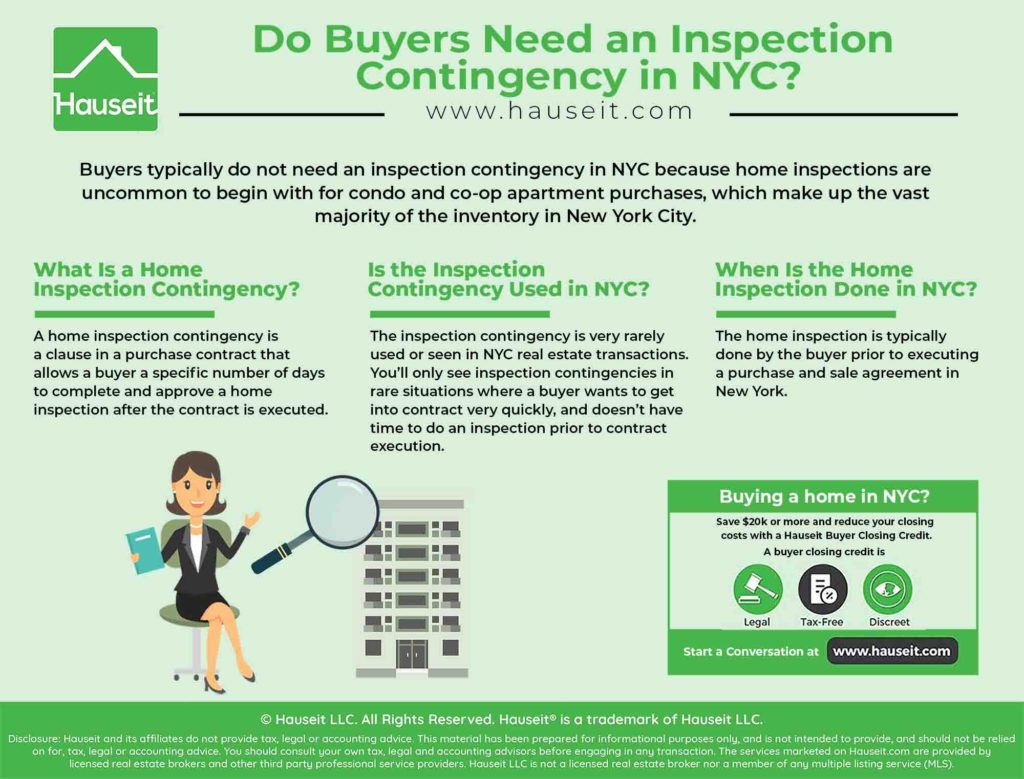Buyers typically do not need an inspection contingency in NYC because home inspections are uncommon for condo and co-op apartment purchases, which make up the vast majority of the inventory in New York City.
Furthermore, when inspections are done in NYC, they are typically done after an accepted offer, but prior to contract execution.
As a result, any negotiations post inspection are sorted out prior to going into contract, if the buyer doesn’t decide to back out first.
Table of Contents

A home inspection contingency is a clause in a purchase contract that allows a buyer a specific number of days to complete and approve a home inspection after the contract is executed.
Depending on the specific language in the contract, the buyer can either:
-
Approve the results of the home inspection report and move forward with the deal, thus waiving the inspection contingency.
-
Reject the results of the home inspection report, exercise the inspection contingency, cancel the contract and get his or her earnest money check back.
-
Ask for repairs to be made by the seller or a monetary concession in lieu of repairs. If the seller agrees, the deal moves forward but if the seller disagrees then the contract is cancelled and the buyer gets his or her contract deposit back.
The buyer may also be allowed to ask for more time and the ability to do a second home inspection if any findings were inconclusive.
What Is a Typical Inspection Contingency Period?
The typical inspection contingency period will vary based on local customs across states, but expect to see one to two weeks as a typical inspection contingency period.
For example, in California the standard residential purchase agreement gives the buyer 17 days to complete a home inspection by default, although this can be negotiated like anything else in real estate.
Our Discretion, Your Advantage
Our traditional partner brokers never openly discount which means less disruption and better execution for you.
The inspection contingency is very rarely used or seen in NYC real estate transactions. In practice, home inspections are done prior to signing a purchase contract, if a buyer bothers with ordering a home inspection at all.
If the home inspector discovers any issues that the buyer did not catch him or herself, the buyer can negotiate after the home inspection with the seller on price or repairs.
In practice, most negotiations will result in a monetary credit vs actual repairs if the seller agrees to any concessions. That’s because properties are sold as is in New York by default, meaning sellers will usually never agree to make repairs or touch-ups to a property at a buyer’s request prior to closing.
This makes sense as sellers are not general contractors or professional renovators, and any repairs could potentially hold up closing.
Are inspections necessary for condos and co-ops?
Inspections are typically not done in NYC for condo and co-op apartment purchases, especially if the buyer is purchasing in a large building with hundreds of units.
That’s because owners are only individually responsible for the interiors of their apartments, and have joint responsibility with all other owners in the building for the “common elements.”
As you can imagine, the impact of funding a new boiler for the building can be pretty insignificant if you have 200 neighbors to share the cost with.
Furthermore, a reading of the condo or co-op board meeting minutes and annual building financial statements might be more useful in determining the building’s resources for operations and repairs.
Lastly, many co-op or condo buildings won’t even allow an individual buyer’s home inspector to access the building’s boilers, furnaces and such.
When might an inspection contingency be used in NYC?
An inspection contingency might be seen if a purchaser has an accelerated timeline, and did not have time to complete a home inspection prior to contract execution.
For example, a buyer may make an offer late in the process in a seller’s market, and the seller gives the buyer only 5 days to produce a signed contract. The buyer may agree but negotiate an inspection contingency into the contract to allow for an inspection after the contract has been signed.
For obvious reasons, this is not preferred by sellers because the inspection contingency gives a significant amount of power to the buyer and an out of the contract. Furthermore, the seller’s property will be listed as in contract and thus no longer being actively marketed, while the buyer still has a reasonable ability to back out of the contract.
A Full Service Listing for 1%
Sell your home with a traditional full service listing for just one percent commission.
The home inspection is typically done by the buyer prior to executing a purchase and sale agreement in New York.
Since real estate offers are not binding in New York until contracts have been fully executed, a buyer has the opportunity to re-negotiate terms with the seller after receiving the results of the home inspection, but prior to contract execution.
Remember that properties are sold in New York on an “as is” basis, and the principle of caveat emptor (Latin for buyer beware) applies in real estate transactions. The latter essentially means that the onus of due diligence falls on the buyer, so much so that sellers typically do not even fill out a property condition disclosure form in New York.
The seller customarily elects to not fill out the property disclosure form, and instead gives the buyer a $500 credit at closing. A small price to pay for selling a property as is without any warranties, guarantees or disclosures!
By concluding the inspection prior to contract execution, both parties are said to be going into the contract with “eyes wide open.”
When should apartment buyers get a home inspection?
Condo and co-op apartment buyers sometimes do choose to get an inspection in certain situations such as the following:
-
Smaller building with under 10 units, meaning each owner will be responsible for a significant share of the building’s budget.
-
Top floor unit to check for potential roof leaks and other concerns that might not be priorities for board members on lower floors.
-
Ground floor unit to check for vermin, flooding and other issues, especially in the case of duplexes where the lower level is partly beneath ground level.
-
Self managed co-op and condo buildings where the building’s documentation may not be audited or thorough.
-
Any free-standing (attached or detached) single or multi-family townhome or house, where the owner is solely responsible for the entire building.
Inspection Contingency Example
Structural Inspection
An assessment by a licensed New York State home inspector that the property is free from any significant electrical, plumbing, wiring, roof, mechanical or structural defects. For the avoidance of doubt, the term significant shall refer to any repairs that cost more than $5,000 to remedy.
Exterminator Inspection
An assessment by a Certified Exterminator that the property is free from infestation by any pests, termites or vermin.
All inspections must be completed at purchaser’s expense prior to [Date]. This contingency shall be deemed to be waived after this date unless purchaser informs seller of the failure of any of these inspections.
If purchaser chooses to notify and provides a copy of the home inspection report, then this entire agreement shall be deemed null, void and cancelled and contract deposits will be returned to the purchaser.
Purchaser can elect to defer cancellation for a period of five (5) days for further inspections or for the parties to negotiate revisions to the contract.
Disclosure: Hauseit® and its affiliates do not provide tax, legal, financial or accounting advice. This material has been prepared for informational purposes only, and is not intended to provide, and should not be relied on for, tax, legal, financial or accounting advice. No representation, guarantee or warranty of any kind is made regarding the completeness or accuracy of information provided.







This article is absolute BS in an extremely hot market like Seattle where there is MASSIVE pent up demand to buy, skyrocketing rents so potential buyers are losing ground every month, and next to NO AVAILABILITY, especially in entry level/”affordable” housing.
Plus, most people looking for their first house (or really, any house), are searching Zillow, Redfin, MLS many times per day. They know EVERY house that’s sold in a neighborhood for the last 6-12 months, and are near-instantly notified when a new house hits the market. Hence, the 20 offers after a single day of showing.
I’ve bought/rehabbed/sold house in the Seattle area for 10 years. And in my experience, while there are SOME good real estate agents, it’s about the most overpaid, under delivering professional field I work with.
With very few exceptions, I was better than most of the “professionals” I hired to get me the most money. While agents are supposedly working for you, they’re really working for themselves. So, they’ll do whatever to convince/influence/execute a transaction.
So, I fired all of them and haven’t looked back.
And, I don’t give the buyers agent a penny. The buyer can do that.
They’re not working for me. And if the buyer wants to wrap their agents fee into the purchase price, that’s fine. They’re just paying the extra taxes.
Thomas, Seattle